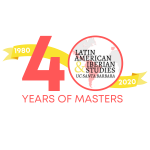
Emma Laura Zamora joins LAIS at UCSB from Cal Poly SLO where she received a B.A. in History. Read on to learn about what motivated Ms. Zamora to study Latin America, her current research plans and more!
What motivated you to study Latin America?
I started off as a history major at Cal Poly SLO, and my interest in Latin America peaked when I took a Political Economy in Latin America and the Middle East class. I read Bitter Fruit and Broken Spears “La Versión de los Vencidos,” and became aware of the one-sided narratives I had been taught in U.S. history. I started to focus on the history of Latin America, its relation to the U.S., and I grew an interest in studying subaltern groups. I decided I wanted to diversify the accounts written on immigrant communities, while continuing to study how Latin America shapes the world.
Why do you believe it’s important to study Latin America?
I remember taking a class in highschool titled, “The History of the Americas.” I asked my teacher at the time, “When are we going to learn about Latin America?” He told me that section of the book was not as important as our lessons on the world wars and the Cold War. This happened in a school that was 70% Hispanic/Latinx at the time, it was as if he was telling me that my history and the history of my peers was not important. Many students do not know that Latin America has played a role in some of the most influential events in history! Events such as the world wars, the Cold War, and the Social Movements and Revolutions of the 60’s and 70’s. In order to understand world history one must study areas of the world outside of the U.S. and Europe, focusing only on the western world is a disservice. I encourage students to look at their history from multiple lenses, including Latin American Studies.
What are you currently researching/or planning to research, and why is it important to you?
I am currently doing research on transnational communities, specifically individuals who commute, work, and live between the United States and Mexico. This research is important to me, because I spent sixteen years of my life living between two borders, and studying these communities makes me feel connected to individuals who have endured the same. I hope to delve into how transfronterizos and the indigenous Kumeyaay defy the concept of borders, while also providing narratives on how the borders are harmful to these groups.
Any interests beyond academia that you would like others to know about?
My interests outside of academia include reading and writing poetry, going on hikes and to the beach with my friends and family, and listening to my musical idol, Selena-Quintanilla Perez. As a student I am interested in student activism and community building.

